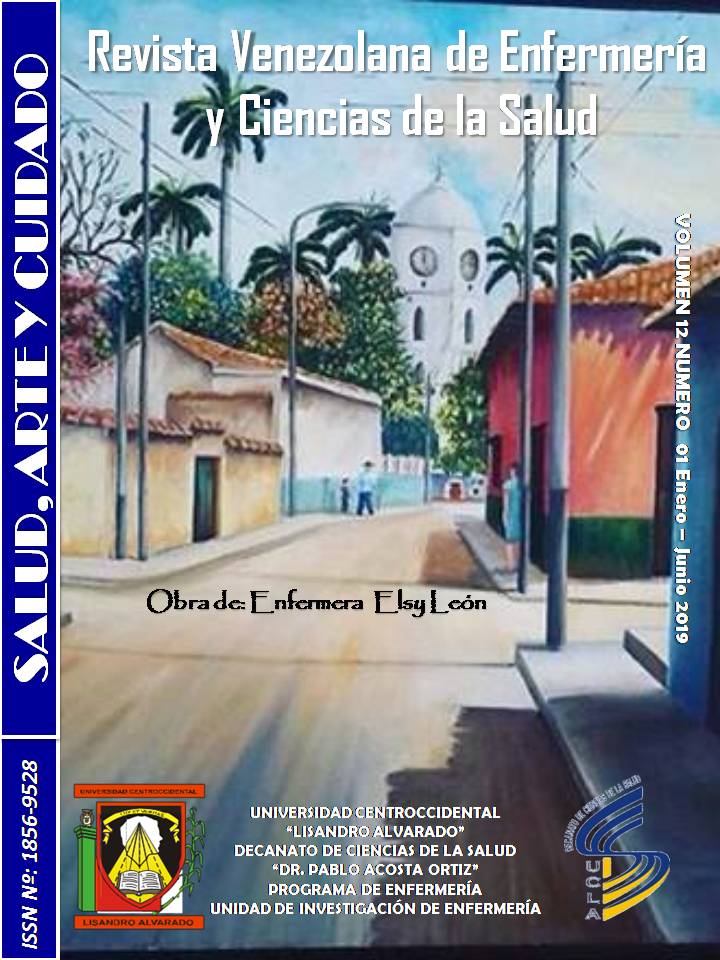PHENOMENOLOGY-HERMENEUTICS AN ATTRACTIVE FOR RESEARCH IN NURSING.
Keywords:
phenomenology, hermeneutics, nursing, care, researchAbstract
The objective of this article is to reflect on the application of the ontological, epistemological and methodological planes of qualitative research, and its incursion in a positive way in the world of research in the nursing profession as a humanistic science in universities, Philosophical bases arise from the interrelation that must exist between the nurse-patient. It is important to highlight that research has undergone a fundamental change throughout its orientation, not only to try to understand traditional research and science; Thus, it was possible to develop and consolidate a more effective practice, that is, the realities whose nature and structures can be observed at least partially, from the outside, may be the object of study by other methods. All this is done on the different philosophical traditions such as phenomenology and hermeneutics, when exploring the thoughts of Edmund Husserl, Martin Heidegger; The two philosophical representations propose a viable methodological strategy to be used in qualitative research in the nursing profession, either under the descriptive school of Husserl and the interpretive position of Heidegger. The nurse needs this philosophy to give an interpretive meaning to the phenomena of the world of life in order to determine the importance of care in health-disease situations, favoring an analysis through the description and interpretation of the phenomena critical-reflective about ourselves. Phenomenology and hermeneutics require rigor as research methods, so that the findings are as accurate as possible from the perspective of those who experience it, and are useful in approaching the phenomenon under study. These research methods give nursing the opportunity to develop, to approach in depth the phenomenon of interest called the care of the human being.
Downloads
References
Husserl, Edmundo. Invitación a la fenomenología. Paidós; Barcelona. 1998
Husserl, Edmundo. Ideas Relativas a una Fenomenología Pura y una Filosofía Fenomenológica. Traducción de Zirión A. México: Fondo de Cultura Económica. 2005
Heidegger. Martin.) Ser y tiempo. Rivera JE (trad.). Santiago de Chile: Editorial Universitaria.1997
Buendía, L., Colás, P. y Hernández, F. (1998). Métodos de Investigación en Psicopedagogía. Madrid: McGraw-Hill / Interamericana de España.
Ricoeur, Paul. Del texto a la acción. Ensayos de hermenéutica II. México: Editorial F.C.E. 2ª ed. 2002
Nightingale, Florence. Notes on Nursing and other writings Kaplan Publishing, New York.(2008)
Consejo Internacional de Enfermería. La investigación de Enfermería: instrumento de acción. Disponible en http://www.icn.ch/matters_researchsp.htm [Consultado el 14 de agosto de 2008].
Diccionario Enciclopédico Océano Uno. Color. Editorial Océano. Barcelona-España. 2004. p. 466
Watson, Jean. (2001) Teoría y Ética del Cuidado. Congreso Venezolano de Cuidado Humano en Salud. Valencia .Venezuela.
Marriner T, Raile A. Modelos y teorías en enfermería. Teoría transcultural de los cuidados. 5 ediciones. Madrid: Harcourt Brace; 2005.
Poblete M, Valenzuela S. Cuidado humanizado: un desafío para las enfermeras en los servicios hospitalarios. Acta Paul. Enferm. 2007; 20(4): 499-503.
Muñoz Y, Coral R, Moreno D, Pinilla D, Suárez Y. Significado del cuidado humanizado en egresadas de la Facultad de Enfermería. Rev. Repertorio de Medicina y Cirugía. 2009; 18(4):246-250.
Published
How to Cite
Issue
Section

This work is licensed under a Creative Commons Attribution-NonCommercial-ShareAlike 4.0 International License.
Derechos del/de autor/es a partir del año de publicación
Esta obra está bajo la licencia:
Creative Commons Reconocimiento-NoComercial-CompartirIgual 4.0 Internacional (CC BY-NC-SA 4.0)
Las opiniones expresadas por los autores no necesariamente reflejan la postura del editor de la publicación ni de la UCLA. Se autoriza la reproducción total o parcial de los textos aquí publicados, siempre y cuando se cite la fuente completa y la dirección electrónica de esta revista. Los autores(as) tienen el derecho de utilizar sus artículos para cualquier propósito siempre y cuando se realice sin fines de lucro. Los autores(as) pueden publicar en internet o cualquier otro medio la versión final aprobada de su trabajo, luego que esta ha sido publicada en esta revista.







